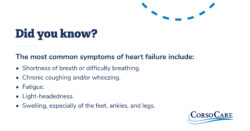![6484_CC - CHF_Type Blog_1900x400_Banner Graphics_08032022_v1-03[4]](https://www.corsocare.com/wp-content/uploads/2022/08/6484_CC-CHF_Type-Blog_1900x400_Banner-Graphics_08032022_v1-034-1-scaled.jpg)
The bad news: Heart failure is a chronic condition that affects 6.2 million people. The good news is that catching heart failure early is crucial to preventing, managing and even reversing the damage it can do.
What makes this tricky is that onset deceptive is that heart failure symptoms in elderly individuals are often confused with regular age-related changes and may be challenging to differentiate from other health conditions.
The key is awareness and an overabundance of caution.
Fatigue and shortness of breath are commonly the first indicators of early heart failure, but there’s a long list of symptoms to look out for.

The most common symptoms of heart failure include:
- Shortness of breath or difficulty breathing
- Chronic coughing and/or wheezing
- Fatigue
- Light-headedness
- Swelling, especially of the feet, ankles, and legs
- Swelling of the belly area (abdomen)
- Nausea
- Loss of appetite
- Rapid or irregular heartbeat
- Difficulty concentrating or decreased alertness
- Chest pain
- Unexplained weight gain
- Reduced ability to exercise
- Persistent cough or wheezing with white or pink blood-tinged mucus
When to See a Doctor
It can’t be emphasized enough —if you are experiencing signs or symptoms of heart failure, see your doctor as soon as possible. Once heart failure is diagnosed, tracking symptoms is still vital for managing the condition, which can significantly impact their overall quality of life.
If You Have Any of the Following, Call 911 Immediately:
- Chest pain
- Fainting or severe weakness
- Rapid or irregular heartbeat associated with shortness of breath, chest pain or fainting
- Sudden, severe shortness of breath and coughing up white or pink, foamy mucus
CorsoCare Is Here for You
For more information on heart failure and how CorsoCare can support you and your loved one, call us at 248-438-8535.

